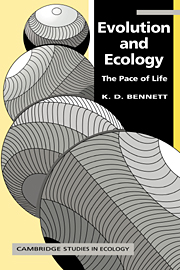Book contents
- Frontmatter
- Contents
- Tables
- Illustrations
- Preface
- 1 Introduction
- 2 Development of ideas
- 3 Orbital-forcing of climatic oscillations
- 4 Geological evidence for orbital-forcing
- 5 Biological response: distribution
- 6 Biological response: evolution
- 7 Biological response: extinction
- 8 Evolution and ecology: synthesis
- References
- Index
2 - Development of ideas
Published online by Cambridge University Press: 31 October 2009
- Frontmatter
- Contents
- Tables
- Illustrations
- Preface
- 1 Introduction
- 2 Development of ideas
- 3 Orbital-forcing of climatic oscillations
- 4 Geological evidence for orbital-forcing
- 5 Biological response: distribution
- 6 Biological response: evolution
- 7 Biological response: extinction
- 8 Evolution and ecology: synthesis
- References
- Index
Summary
This chapter presents the current status of thinking on evolutionary processes in ecological and geological time. Subsequent chapters examine actual data from the fossil record, but, since the way we see data is shaped by the ideas available for interpretation, the development of evolutionary and ecological theory will be presented first. Evolutionary theory has, unfortunately, become replete with claim and counter-claim about evolutionary processes, and the degree to which they can or cannot be resolved with the ideas of Darwin (1859). It is now impossible to obtain a balanced view by summarizing the literature, because too high a proportion of it is already secondary. Some of the primary sources went through several editions and the author's ideas shifted fundamentally, so it can make a difference which edition is being cited (Peckham 1959). If ever an area of scientific literature had an excessive ratio of words to ideas, this is it. Much of the debate has become confused by the similarity in language and terminology of various aspects of evolution, and the scientific environment at the time of writing has not received corresponding attention.
This chapter discusses the development of ideas in evolution and ecology relative to advancing knowledge of the details of Earth history, especially with respect to the Earth's orbital variations and Quaternary ice-ages. The aim is to show how the present state of affairs came about.
Evolutionary processes
Scientific beginnings
There is a long history of evolutionary and ecological thought over many centuries (Mayr 1982). But it is during the last century that those ideas that came to shape modern thinking were expressed scientifically, especially following Charles Darwin and his contemporaries, notably Charles Lyell and Alfred Wallace.
- Type
- Chapter
- Information
- Evolution and EcologyThe Pace of Life, pp. 6 - 43Publisher: Cambridge University PressPrint publication year: 1996



